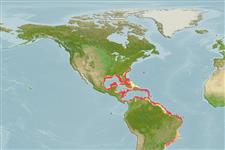Environment: milieu / climate zone / depth range / distribution range
Ecology
Marine; reef-associated; non-migratory; depth range 5 - 330 m (Ref. 13442), usually 70 - 330 m (Ref. 13442). Subtropical; 35°N - 27°S, 98°W - 33°W (Ref. 5222)
Western Atlantic: North Carolina, USA to southern Brazil, including the Gulf of Mexico, Caribbean, and Bermuda; strays occur north to Massachusetts.
Length at first maturity / Size / Weight / Age
Maturity: Lm 54.4, range 35 - 98 cm
Max length : 125 cm TL male/unsexed; (Ref. 26340); common length : 50.0 cm TL male/unsexed; (Ref. 5217); max. published weight: 23.0 kg (Ref. 9710); max. reported age: 25 years (Ref. 5222)
Dorsal spines (total): 11; Dorsal soft rays (total): 16 - 17; Anal spines: 3; Anal soft rays: 8 - 10. Color of head and body dark reddish brown, shading to pink or reddish below. Opercle with 3 flat spines, the middle one being the largest. Vertical fins angulate in larger fish. Pelvic fins shorter than pectorals and inserted slightly behind ventral and pectoral-fin base. Bases of soft dorsal and anal fins covered with scales and thick skin. No saddle on caudal peduncle. Interspinous membranes not incised (Ref. 26938); head length 2.3-2.5 times in SL; convex interorbital; subangular preopercle, serrae at angle slightly enlarged; straight upper edge of operculum; posterior and anterior nostrils subequal (Ref. 89707).
Adults occur mainly over rocky and muddy bottoms. Uncommon around coral reefs. Usually rest on the bottom (Ref. 9710). Juveniles may be found in shallow water, but adults are usually taken from depths of 70-330 m (Ref. 13442). Feed on a wide variety of fishes and invertebrates. Are protogynous hermaphrodites (Ref. 55367). Most females transform to males between ages 7 to 14. Susceptible to red tide toxin (Ptychodiscus brevi) (Ref. 5222). Marketed fresh or frozen. The world record for hook and line, 39 lbs., from Cape Canaveral, Florida (Ref. 13442).
Sex change occurs at 75.5 cm TL and 9.5 years of age (Ref. 55367).
Heemstra, P.C. and J.E. Randall, 1993. FAO Species Catalogue. Vol. 16. Groupers of the world (family Serranidae, subfamily Epinephelinae). An annotated and illustrated catalogue of the grouper, rockcod, hind, coral grouper and lyretail species known to date. Rome: FAO. FAO Fish. Synop. 125(16):382 p. (Ref. 5222)
IUCN Red List Status (Ref. 130435)
Human uses
Fisheries: commercial; gamefish: yes; aquarium: public aquariums
Tools
Special reports
Download XML
Internet sources
Estimates based on models
Preferred temperature (Ref.
123201): 11.5 - 25.7, mean 19.1 °C (based on 233 cells).
Phylogenetic diversity index (Ref.
82804): PD
50 = 0.5000 [Uniqueness, from 0.5 = low to 2.0 = high].
Bayesian length-weight: a=0.01445 (0.00940 - 0.02223), b=3.00 (2.88 - 3.12), in cm total length, based on LWR estimates for this species & Genus-body shape (Ref.
93245).
Trophic level (Ref.
69278): 3.5 ±0.5 se; based on diet studies.
Generation time: 8.9 (6.9 - 10.9) years. Estimated as median ln(3)/K based on 15
growth studies.
Resilience (Ref.
120179): Medium, minimum population doubling time 1.4 - 4.4 years (K=0.1-0.18; tm=4-6; tmax=25; Fec=1.4 million).
Prior r = 0.64, 95% CL = 0.42 - 0.96, Based on 2 full stock assessments.
Fishing Vulnerability (Ref.
59153): High vulnerability (64 of 100).
Climate Vulnerability (Ref.
125649): High vulnerability (63 of 100).
Nutrients (Ref.
124155): Calcium = 9.76 [3.62, 22.19] mg/100g; Iron = 0.41 [0.20, 0.85] mg/100g; Protein = 19.1 [17.5, 20.5] %; Omega3 = 0.176 [0.093, 0.338] g/100g; Selenium = 30.3 [14.5, 64.1] μg/100g; VitaminA = 65.2 [15.5, 263.8] μg/100g; Zinc = 0.743 [0.486, 1.122] mg/100g (wet weight);
